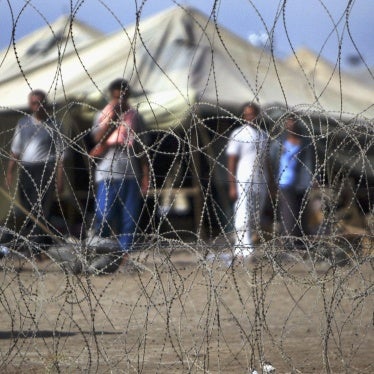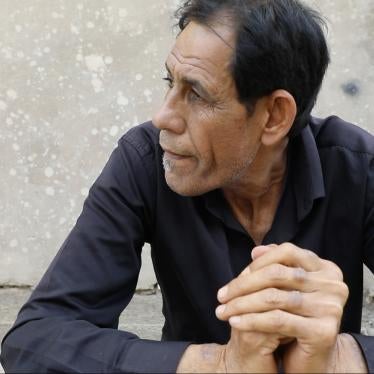The prisoner was taken away in the middle of the night 19 months ago. He was hooded and brought to an undisclosed location. He has not been heard of since. Interrogators reportedly used graduated levels of force on the prisoner, including the "water boarding" technique - known in Latin America as the "submarino" - in which the detainee is strapped down, forcibly pushed under water and made to believe he might drown. His 7- and 9- year-old sons were also picked up, presumably to induce him to talk.
The Guatemalan Army? Colombian paramilitaries? No, the Central Intelligence Agency. The prisoner is Khalid Sheikh Mohammed, the principal architect of the Sept. 11 attacks. "KSM" is one of the dozen or so top Al Qaeda operatives who have simply disappeared in U.S. custody.
In the aftermath of the Sept. 11 attacks, the Bush administration has violated the most basic legal norms in its treatment of security detainees. Many have been held in offshore prisons, the best known of which is at Guantánamo Bay, Cuba.
As we now know, prisoners suspected of terrorism—and many against whom no evidence exists—have been mistreated, humiliated and tortured. But perhaps no practice so fundamentally challenges the foundations of U.S. and international law as the long-term secret, incommunicado detention of Al Qaeda suspects in "undisclosed locations."
These "disappearances" may not have the same connotation as they did in the "dirty wars" of Latin American dictatorships, when it was a euphemism for death. But holding prisoners in total secrecy appears to have become a central U.S. tactic in its war on terrorism.
The CIA's "disappeared" prisoners also include Abu Zubaydah, a close aide of Osama bin Laden, Ramzi bin al-Shibh, who but for his failure to get a U.S. visa might have been one of the 9/11 hijackers, and Abd al-Rahim al-Nashiri, alleged the mastermind of the U.S.S. Cole bombing.
According to the recent Schlesinger panel on detainee operations, the CIA has been allowed "to operate under different rules." Those rules stem in part from an August 2002 Justice Department memo, in response to a CIA request for guidance, which said that torturing Al Qaeda detainees "may be justified," and that international laws against torture "may be unconstitutional if applied to interrogations" conducted in the war on terrorism.
Some of the detainees, such as "KSM," are indeed reported to have been tortured in custody. Many are said to have provided valuable intelligence, intelligence that has foiled plots and saved lives. Some are said to have lied under duress to please their captors. (Ibn Al-Shaykh al-Libi apparently fabricated the claim, relayed by Secretary of State Colin Powell to the United Nations, that Iraq had provided training in "poisons and deadly gases" for Al Qaeda.) The United States has acknowledged the detention of many, but not of all. The one thing all the detainees have in common is that the United States has refused to disclose their whereabouts and has refused to allow them access to their families, to lawyers or to the International Committee of the Red Cross.
These are not nice men, to say the least. Why should we care about what happens to them? First, because, despite the information apparently gleaned from some of these suspects, overall the U.S. treatment of its prisoners has been a boon rather than a setback for Al Qaeda, and has thereby made the world less safe from terror. As the Sept. 11 commission said, "allegations that the United States abused prisoners in its custody make it harder to build the diplomatic, political, and military alliances the government will need."
Second, the torture and "disappearance" of prisoners by the United States invites all the unsavory governments in the world to do the same. Indeed, countries from Sudan to Zimbabwe have already cited Abu Ghraib and other U.S. actions to justify their own practices or to blunt criticism.
But our concern must stem, first and foremost, from the acceptance of methods which are antithetical to a democracy and which betray the U.S. identity as a nation of law. If the United States embraces the torture and "disappearance" of its opponents, it abandons its ideals and becomes a lesser nation.
Reed Brody, special counsel with Human Rights Watch, is the author of a new report, “Disappeared: the United States' Ghost Detainees.”








